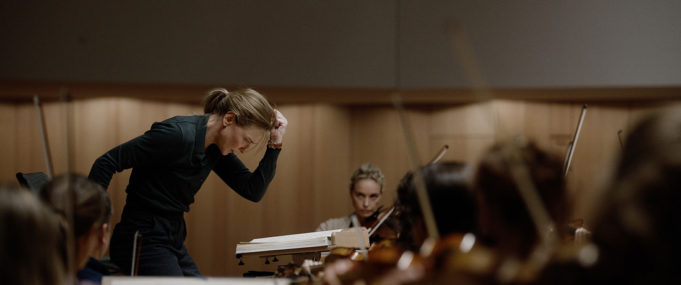Sexual harassment can happen in most professions, but classical music makes it particularly easy. Teachers spend a great deal of one-on-one time with students, top musicians frequently start playing in childhood, and authority figures such as conductors wield enormous power over the careers of the musicians under them. The system is ripe for abuse, thus the disgraceful revelations about James Levine, Plácido Domingo, and Charles Dutoit (plus those unverified but persistent rumors of Herbert von Karajan molesting little boys). Todd Field’s Tár knows this and also knows that women can be both predators and victims, which helps make this product of the #MeToo era attain genuine tragic stature.
Cate Blanchett portrays Lydia Tár, who is on top of the world as the story opens. An EGOT-winning composer who has conducted all of America’s “Big Five” orchestras, she’s the first woman ever to be music director of the Berlin Philharmonic. The first crack in the dam is the news of a 25-year-old ex-protégée committing suicide, after Lydia made her unemployable by telling the likes of Sir Simon Rattle and Riccardo Muti that she was mentally unstable. Even though Lydia is married to her German concertmaster (Nina Hoss), social media buzzes that she’s sleeping with her female students. Worse, she passes over her French personal assistant (Noémie Merlant) for an assistant conductor position despite the dirt she has on Lydia. Amid all this, the maestra eyeballs a cute Russian cellist (Sophie Kauer) who has just joined the orchestra, and her wife and the other musicians can’t help but notice. No wonder that when Lydia goes running through the streets of Berlin for exercise, she keeps looking back. Something’s gaining on her.
Lydia is partially, inevitably based on Marin Alsop, who conducted the Fort Worth Symphony Orchestra at this past summer’s Van Cliburn Competition. Alsop is also gay and American just like Lydia and remains the only woman to serve as music director at any major orchestra in the world. Lydia name-checks Alsop to establish that they’re not the same. She also references Oscar-winner Hildur Guðnadóttir, who scores this film and writes Lydia’s musical compositions.
This is the third film by Todd Field (as well as his first from an original script and his first since his 2006 drama Little Children), and the actor-turned-filmmaker’s classical music references are crushingly on point. The actors all play their own instruments, and it’s really Blanchett conducting the storied Berlin Phil and playing the piano, imitating Glenn Gould by crouching low over the keys and playing hyperarticulately.
The star and her killer tailored suits (by costume designer Bina Daigeler) do much to convince us of Lydia’s musical greatness, and Field shows her placing the trumpeter in the concert hall’s audio booth for the famous fanfare that opens Mahler’s Fifth Symphony, thus producing the faraway sound effect that she wants. Lydia’s genius complicates — though it doesn’t mitigate — the damage she does to herself and others by seeking out affairs with beautiful young female musicians. Maybe it takes a thrill-seeking personality to conduct an orchestra at a high level, but it’s appalling and compelling to watch her as she keeps making self-destructive decisions, like giving that Russian newcomer a plum solo assignment instead of more experienced musicians. (Kauer gives a crackling account of Elgar’s Cello Concerto, too.) It’s stupid, but doesn’t this fit with what we know about abusers? They do their thing out in the open, and everyone is content to ignore it until that becomes impossible.
The visual gloss here fits the setting of the rarefied reaches of Lydia’s social world, and Field pairs that with some dazzling camerawork, as in a one-take scene when Lydia gives a masterclass at Juilliard and humiliates a Black nonbinary student (Zethphan Smith-Gneist) after he trash-talks Bach. The shifting camera catches everything: the musicians playing Anna Thorvaldsdottir’s Ró, the student’s leg nervously twitching, and Lydia striding through the music classroom while delivering pronouncements on why ego has no place in conducting.
Even after her precipitous fall from her perch, Lydia never acknowledges any wrongdoing or causing pain to the people around her (including her wife, a victim but not an innocent one in this). Then again, we don’t hear her complain, either, when she ends up conducting a youth orchestra in a classical music backwater under circumstances many musicians would find degrading. She puts her head down and gets back to work, and there’s something admirable about that, as contemptible as the behavior that led up to it has been. Tár brings its Mahlerian breadth of character and atmosphere to a close on that unresolved note, and it deserves a shout of “Bravissimo!”
Tár
Starring Cate Blanchett. Written and directed by Todd Field. Rated R.












